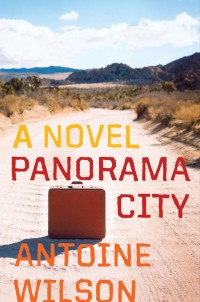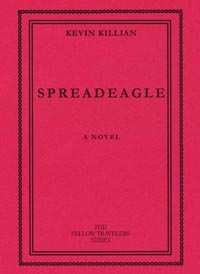HBO’s hit TV show GIRLS: what it should mean for everyone

I feel an enormous (and delicious) pressure to write about the hit TV show GIRLS, now on HBO, every Sunday. I have been told by my editors that women read, watch TV, and purchase “added value” products. I was surprised to learn that anyone still does these things. READ MORE >
Exodus; an interview with Lars Iyer
 What Lars Iyer has managed to do in his trilogy, spanning from Spurious, through Dogma, and now to Exodus—the final book soon to be released from Melville House—feels rather unprecedented. At once these are individually these brilliant picaresque novels ambling through Europe and America; as well as idealistic conversational pieces between his protagonist, Lars, and his counterpart W. Perhaps my favorite aspect of Iyer’s work is the brilliant ways in which he’s able to meld the artists and thinkers of yore, with those today—weaving long conversations about Kafka seamlessly with those about filmmaker Bela Tarr. I’ve loved these novels, and watching them form an official trilogy has me ready to start right over reading them, or anxiously await Iyer’s next effort. I had the opportunity to ask Lars Iyer several questions upon the release of Exodus. We discussed many things, from Nietzsche to Pasolini, and Iyer was prolific in his responses.
What Lars Iyer has managed to do in his trilogy, spanning from Spurious, through Dogma, and now to Exodus—the final book soon to be released from Melville House—feels rather unprecedented. At once these are individually these brilliant picaresque novels ambling through Europe and America; as well as idealistic conversational pieces between his protagonist, Lars, and his counterpart W. Perhaps my favorite aspect of Iyer’s work is the brilliant ways in which he’s able to meld the artists and thinkers of yore, with those today—weaving long conversations about Kafka seamlessly with those about filmmaker Bela Tarr. I’ve loved these novels, and watching them form an official trilogy has me ready to start right over reading them, or anxiously await Iyer’s next effort. I had the opportunity to ask Lars Iyer several questions upon the release of Exodus. We discussed many things, from Nietzsche to Pasolini, and Iyer was prolific in his responses.
***
GM: When it was decided that this interview would happen, I went to check your blog for any updates and found the first entry to be an interview excerpt of Pasolini. Your work draws comparisons from fields far outside the immediate realm of literature—speaking here both of philosophers and filmmakers, comedians and old scribes—so I was wondering about the other side of things; as a writer, how do you address the taboo notion of influence? Do you see the influence of a filmmaker or philosopher as distinctly different than that of a write you greatly admire?
LI: You refer to quotations by Pasolini I excerpted on my blog. I put up quotations of this kind from all manner of sources – from film directors, artists, philosophers, writers and so on – anything I find intriguing, anything encouraging or ‘true’ in some sense. I quote from those I take to be allies – friends of a kind, who I imagine stand with me against common enemies. In this way, I try to spur myself on, especially during those dry periods when I can’t think of anything to write in my own name. The field of endeavour of those whom I quote are of little consequence in this regard – film, art, philosophy, literature – I’m looking only to be enlivened, for an axe to shatter my frozen sea.
How would I address the question of influence? One temptation, in speaking of the works of those who have meant most to you, is to give a narrative – of having read this and then that, of having incorporated this lesson and then that one – without considering how the texts in question transformed your methods of narration, and your ability to construct a coherent narrative regarding what was important to you. There is the risk of rendering linear and personal what is a much more complex reality, in which linearity and the very notion of the ‘personal’ are open to question.
Let me make this concrete. There was a time when lyrical works appealed to me, and lyrical ways of recasting your experience. So I wrote in a lyrical mode, of things that would allow of lyrical treatment. I took various lyrical writers as exemplars. As I grew older, overwhelmed by a world that seemed ill-fitted for such treatment, these modes seemed lifeless to me.
25 Points: Panorama City
 Panorama City
Panorama City
by Antoine Wilson
Houghton Mifflin Harcourt, 2012
292 pages / $24.00 buy from Amazon
1. Panorama City is narrated by Oppen Porter, begins with the death and burial and unburial of his father, deals much with working in fast food restaurants, a suspect Christian coffee shop, and a beautiful psychic; the book primarily chronicles a forty day period when Oppen lived with his aunt in Panorama City. There is something Biblical about it.
2. The book is a monologue. Each section is divided up into paragraphs. There is a space between each paragraph. Oppen, on what he expects to be his deathbed, is trying to record his collected experience for the benefit of the son he is about to have. He is talking into a cassette recorder; you can tell he is talking very fast, through nearly the whole book it seems like he is going to run out of air.
3. The sentences in this book sprawl, stretch, snap, expand, loop, twirl, and collapse back in on themselves like exploding stars.
4. There is a scene in which a character falls through a ceiling. It is probably worth reading the whole book just for that scene.
5. Usually when people say that a book demanded to be read, or reached out and grabbed them by the throat, or got them in a chokehold, or some related metaphor for attention-grabbing, I shrug my shoulders. Not every good book demands to be read. In fact, a book has never demanded for me to read it—and this is what is cool about books. They’re not loud; they have no quirky camera cuts. All books, at least those in traditional form, are handheld, but unless you have gotten your book very wet the text stays exactly in the same spot on the page no matter what angle from which you look at the book. This is good.
6. Panorama City split me open. It is full of beauty; it is full of truth. I think John Keats would’ve liked it.
7. This book demands to be read, #5 be damned.
8. I’ve heard that one of the main pleasures of reading good fiction is that of recognition but I haven’t heard many people express that it can be one of the chief pains of reading fiction, too. I felt like the book was examining me.
9. This book is full of characters that spout what seems like cheap wisdom that instead actually turns out to be pretty fucking wise. Oppen Porter should speak for himself:
10. “The revelation of an eternal soul should occasion drinking of beer and looking at the sky, Paul’s words, because word eternal means, above all, that we have time.” I wish more religious people would realize this. I wish I could realize this. READ MORE >
January 29th, 2013 / 9:09 am
Cabbies, Tarot, Women, New Orleans, Confidence Man, Murder, Crocodiles, Dirt
 Errata
Errata
by Michael Allen Zell
Lavender Ink, August 2012
112 Pages / $15.00 Buy from Amazon
It seems that Michael Allen Zell took a page from Joyce in constructing his novel, following the idea of writing a simple story in a complex matter. Though instead of burying a narrative in puns, homonyms, invented words, syntactical buggery, and so on, Zell let’s the narrative of his novel Errata wind and turn much in the same fashion that the books protagonist, Raymond Russel (an homage to Roussel for sure), drives his taxi through the city of New Orleans: never from point A to point B, as most fare would expect, but rather in methods that involve spelling out his own name by looping through streets, taking roads that are less visited and more lonely, deviations upon deviations, until finally arriving at his point. And it is in this construction, the simple narrative interrupted by diversion, that the book holds its strength.
Errata‘s narrative is casually described as neo-noir on the back of the book, and to summarize the book rapidly this would, indeed, suffice, but to reduce the book to this cliché–clichés existing only in language, not in the narrative of life, as our narrator remarks on the last page of the book–takes away what it is that makes the short book so pleasurable. It’s filled with asides, asides on literature, mostly on Melville’s Confidence Man, Schulz’s “Street of Crocodiles,” Infante’s Three Trapped Tigers, and of course, oh yes of course, the ever present Borges. Aside from literature there is much discussion of beards, of a life being lived casually and hermit-like, to the enjoyment of simplicity; all outside of systematic structures that dominate the 20th century. Though it’s set in the mid-1980s there’s little to indicate that outside of a few passing phrases, there is no cultural nostalgia here, and similarly the location of New Orleans seems but a moot point to what’s happening: there is a girl, there is a man, there is a life lived to only a certain degree, there is a climax: Call the burial, dirt rest.
Zell’s book approaches the text as a reader more than a writer, aware of what brings the author pleasure in reading, this pleasure is in turn passed on to the reader, “Raymond, do you want to look back on your life and think at least I watched a lot of television??” There’s a three page rant about how printed dialog is a futility; there are cues that make me think of what a friend said about writing, how most readers simply confuse the idea of “character development” with authorial intent, a terrible habit picked up in reductive literature classes offered in primary education, these early moldings of the head when we learn to be taught what exactly makes “good literature.”
But the story, buried beneath everything else, is simple and solid. There is a plot that the narrator becomes involved in. There is an excessive amount of insomnia, which leads, in turn, to the writing of the notebook that we, outside of this textual diegesis, are reading, Errata; there’s a meta-text that doesn’t wink at the reader, rather actually probes & functions on the level of affect. This is, perhaps, one of the smartest contemporary novels that I’ve encountered, and because of that, I ultimately appreciate it being written. As a nod to the novel’s protagonist, I consider it the highest honor to now be using the book, which I’ve finished, to prop up my crooked desk, which formerly would shift back and forth, rocking like a boat on the gentle sea as I typed letters and words and numbers into this machine. A book as infrastructure, something solid.
January 28th, 2013 / 1:01 pm
Spreadeagle by Kevin Killian
 Spreadeagle
Spreadeagle
by Kevin Killian
Publication Studio, 2012
590 pages / $16 Buy from Publication Studio
There are moments when Evan Lysacek or whoever is figure skating on video. Where what you hear is the intense carving sound of the blade on the massive expanse of ice (that and tacky music); where what you see are limb size hocks of sparkling lycra (that and wisps of breath in the cold); where it’s about precision, carnival and also about risk, and where it feels like so much is at stake. There are moments like this when reading Kevin Killian’s new novel Spreadeagle: his wit as sharp as any Jackson Ultima Blade, his prose as sparkling as any Sharene and this novel as breathtaking, terrifying and exhilarating as a five rotation axe.
A figure skating move isn’t all that the title Spreadeagle might conjure up. It’s also a heraldic symbol, a ballroom dance move, a bondage restraint, a sexual position in which the legs are splayed akimbo, a method of a particular species of jumping spider swimming and the shape of the body adopted just prior to undertaking a sky dive. All of these seem like apt references, all in one way or another appropriate to the power play and textual and sexual politics that play out in this book.
The novel itself is spread spatchcock into two quite different – though linked- parts. The first is the very best sort of comic novel, with all the wit, humour and deliciously droll dialogue of “A Nest of Ninnies” or “What’s for Dinner?” It takes place in the grand San Francisco home (so grand it’s mistaken for an embassy or a museum) of novelist Danny Isham. Danny is the author of the successful Rick and Dick series of gay novels (so wildly successful that he’s perennially mistaken for Armistead Maupin- even by Francois Ozon!) and his partner is Kit, an activist, who, as we meet him, is returning from Cuba surrounded by a troupe of Kylie Minogue-obsessed holiday makers.
January 28th, 2013 / 12:00 pm
Brian Allen Carr, from Texas, is awesome. Somebody gave his book Short Bus a 1-star review at Amazon, but he says it’s a crappy review. So he’s doing a “Lone Star” contest: write the best 1-star review of the book by the end of February, and he’ll give you all three of his books, including the newest, Edie and the Low-Hung Hands (Small Doggies Press).
DIED: The Verbessem Brothers

Marc and Eddy were deaf and learned that soon they would both go blind. They were 45 and twins. Because they were Belgian, the option of assisted suicide was available to them. Believing they would no longer be able to live self-sufficiently, and to communicate with each other and family (they had developed their own sign language), they chose death by lethal injection. Before they died, they had coffee. READ MORE >
How To Basic
He doesn’t say anything. There is no music, just food sounds, a suck and flap of raw meat hitting things, eggs smacked. I like most of all that he doesn’t talk. Doesn’t call this stuff anything, doesn’t name it.
Sometimes there is a joke: the food comes fully formed out of the oven, like silly, boring magic.
That is not as good as when the food just stays fucked up. Still, it seems like he can’t help but smash the food when it is most right. In this one the camera is shaking so much after he pounds the chicken apart. He is putting the smashed chicken into the oven for the joke to come out and he is shaking so much.
Dear People of the Future…
Renowned Bay Area songwriter, Michael Zapruder, has just released a highly ambitious project titled Pink Thunder, which involved him setting 22 poems (written by excellent contemporary poets including David Berman, Valzhyna Mort, Matthew Rohrer, Bob Hicok, and Noelle Kocot) to music. Beyond the straight-forward release of the musical material on pink vinyl (The Kora Records), Black Ocean has put out a hardcover book containing a CD and beautifully hand-lettered copies of the poems rendered by Arrington De Dionyso. Zapruder also created a series of what he calls “portmanteaus,” small sculptural objects that function as digital music boxes that play songs from Pink Thunder. The project, which was 6 years in the making, originated with Zapruder joining the Wave Books poetry bus tour for a week, meeting and working directly with the cream of the crop of young, innovative poets. [Also see this article in the San Francisco Bay Guardian]
Full Disclosure: While I had nothing whatsoever to do with the making of this project, I have known and worked with Michael since 2004, and I wrote the introduction to the Pink Thunder book. However, I found the scope of this project to beg greater creative and cultural concerns than could be fully addressed in the introduction to the book.
***
Dear People of the Future,
With your lightning powered aggregators, your nanomembranophones, your hydrolytic isomer skin-suit apparatus, it will require an imaginative leap wider than the great San Andreas Canyon that separates The People’s Republic of California from the once great nation of the “United” States to conceive of the cultural landscape in which Michael Zapruder’s Pink Thunder, which I recommend you ingest via light pulse array, was created.
This is a little difficult to explain, but for a brief aberrant cycle in the history of human civilization, a violent minority of militaristic nations operated according to a spurious system based almost exclusively on the degradation of spirit via mass production and mechanized standardization, and on the pacification of the majority populace by reducing their access to education, nutritious food and health care, and increasing their access to pleasure-center stimulants. Weird, right? It’s likely you’ve never even heard of this cycle as its ideas were surely so overwhelmingly disproven and unanimously rejected as to be expunged from the annals of history.
January 25th, 2013 / 12:00 pm


